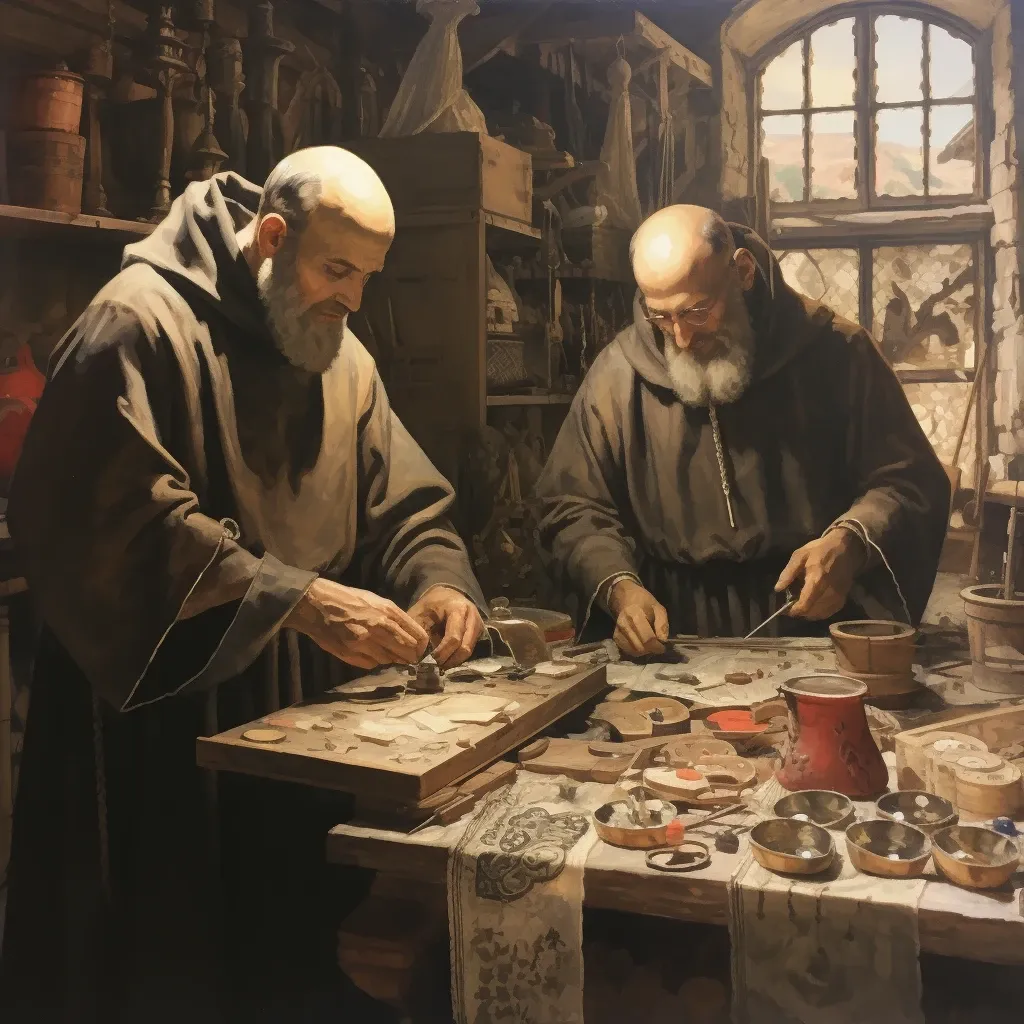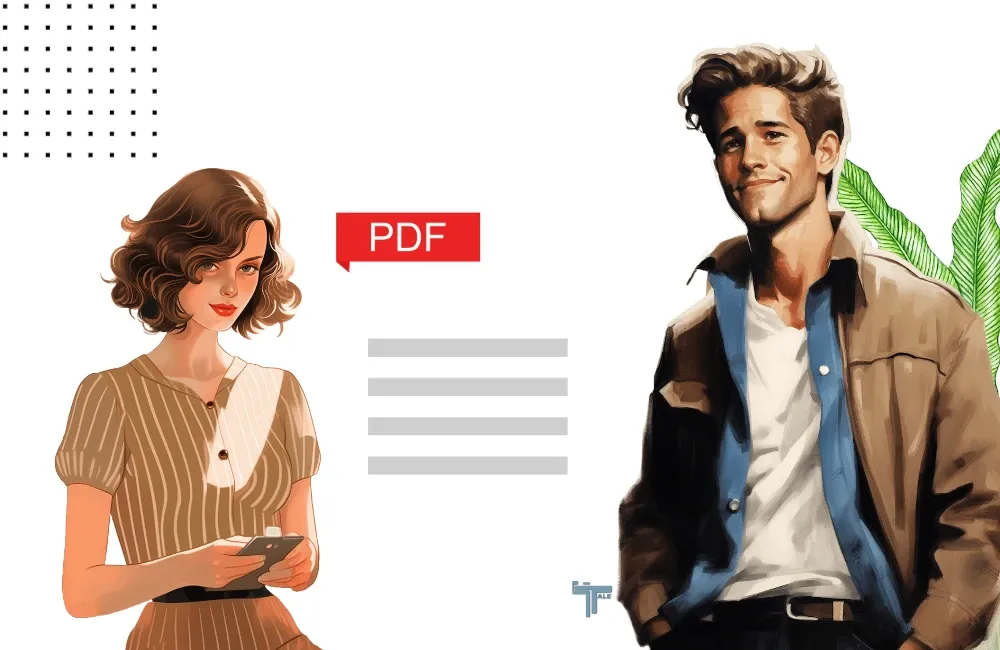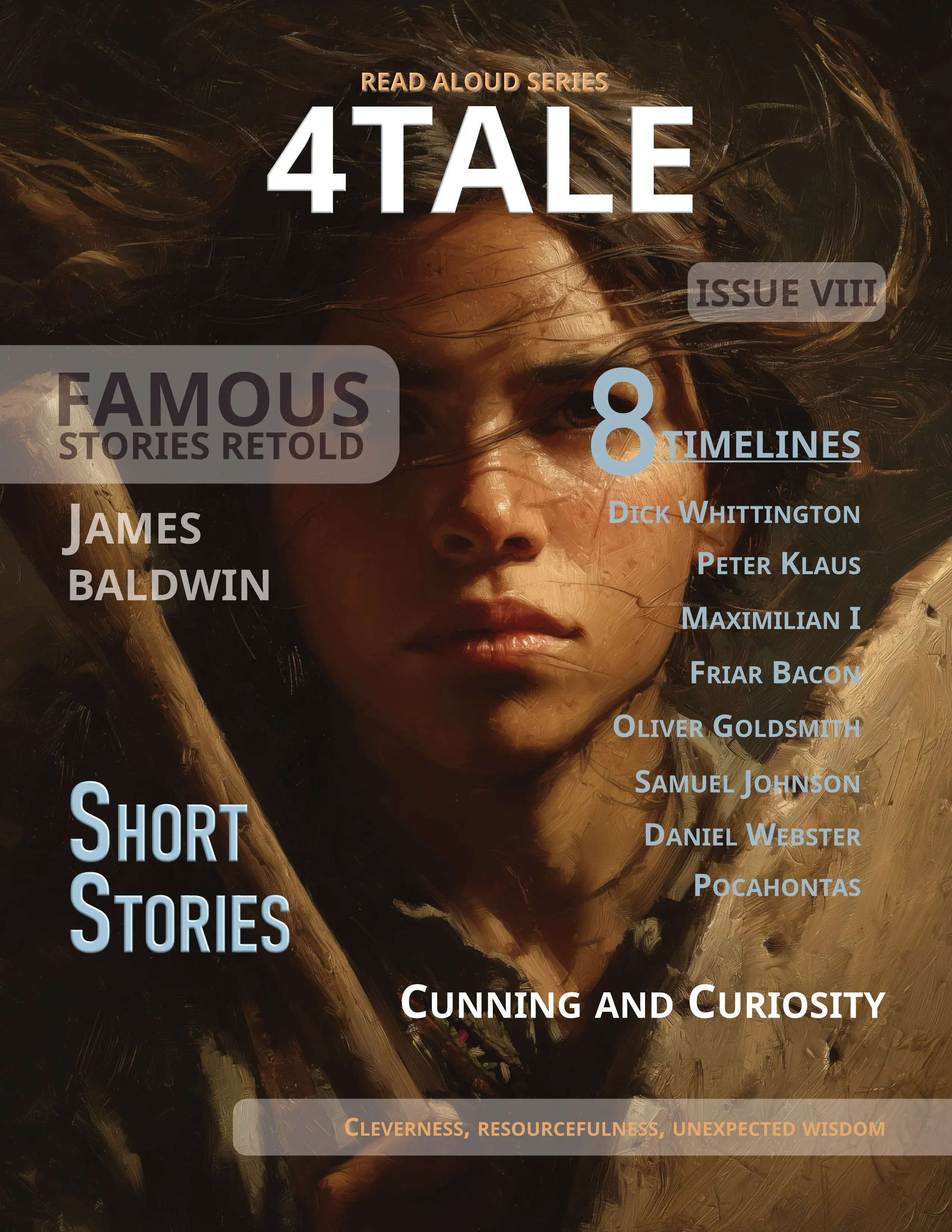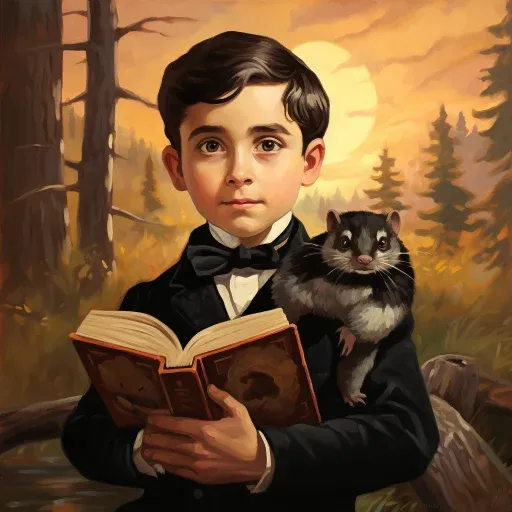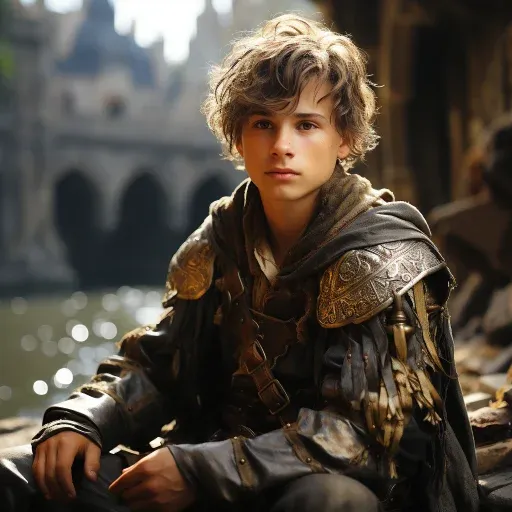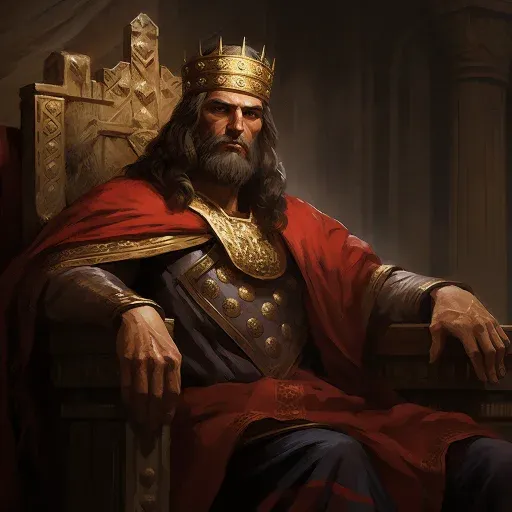I. THE WIZARD
More than seven hundred years ago there was a professor in the University of Oxford whose name was Roger Bacon. People called him Friar Bacon; for he was a monk, and in those days only monks and priests had anything to do with learning.
Friar Bacon was the greatest scholar in all Europe. He knew so much more than his brother professors and monks that some of them said he was a wizard and got all his learning by the practice of magic. The common people looked upon him with awe; and when they chanced to meet him, or saw him at a distance, they muttered a charm to ward off any evil spell that he might cast upon them. The friar cared but little for all the talk that was going on. He smiled, and continued his studies and experiments just as before. "It makes little difference what they say," he said.
One day he made a mixture of saltpeter, charcoal, and sulphur, and invited several of the professors to come and look at it. What was their amazement, when he touched it with the smallest spark, to see the whole mixture go up in air with a blinding flash and a fearful roar! It was only gun-powder; but people were then ignorant of that useful and fearful compound, and they would have nothing to do with it for yet two hundred years.
"We told you so!" shouted the frightened monks as they rushed out of the room. "He is a wizard. No honest man could kindle a blaze so blinding or make a sound so fearful. Why, the very earth trembled, and the smoke was like that from a volcano. If this man is allowed to go on he will destroy us all."
The end of the whole matter was that they put him out of the university and said that they would have no more of his magical doings. And to make sure that he would let them alone, they locked him up in a narrow cell and gave him only bread and water, and little enough of that. Some even talked of fagots and fire as the very best things to cure a wizard; but they dared not be too severe with the friar lest they should displease the Pope.
Now the Pope knew Friar Bacon very well. In fact, the two had been students at the same school in Paris when both were young. They had formed a friendship at that time which was never to be broken. The Pope was a wise and broad-minded man, and he did not object to a little magic of the kind in which Friar Bacon delighted; and when the fame of Bacon's learning came to his ears he felt himself honored by being the friend of such a man.
The action of the monks and professors at Oxford was anything but pleasing to him. "The foolish fellows!" he exclaimed. "They would punish the wisest man of the age simply because he shows them their own ignorance." And he commanded that the friar should be given his freedom and be permitted to go where he chose.
The professors could do nothing but obey. With solemn looks, but with oily words on their tongues, they unbolted the door of the prison cell and bade their prisoner come out and enjoy the sunshine again. "We would not do you any harm for the world," they said; "and to prove our friendship for you, we will pay your expenses to London, or even to Paris, if you wish to go there. The University of Oxford is but a poor place for a man of your talents. Another person has already been chosen to fill your chair."
This they said, hoping to get rid of him.
II. THE MANUSCRIPT
Friar Bacon was not ready, however, to go far from Oxford. In the tower of an old monastery near by he found a room which exactly suited his wants, and there he resolved to stay until he had finished some experiments that he wished to try. He had a learned friend, Friar Bungay, who came daily to visit him; and his servant Miles kept the room in order and attended to all his wants. He was happier there, with his books and his instruments and his chemicals, than he could have been in London or in Paris.
Every night, until long after the midnight hour, the light of the friar's little lamp could be seen glimmering through the narrow window of his study and feebly twinkling in the darkness. The country people who saw it at a distance shook their heads, and whispered that the old wizard was busy with his magic again. And then they talked of the fearful things that had been seen and heard around the gloomy old tower. One man who had ventured quite close to it on a dark night had beheld blue flames dancing on the eaves and sheets of fire leaping from the roof. Another had heard dreadful shrieks and sharp, deafening sounds like thunder-claps issuing from the tower. A third had seen a star shoot from the friar's window and lose itself far up in the sky. Such tales filled many a simple heart with awe.
Within his room, surrounded by his books and his instruments, Friar Bacon was content to let the world think of him as it would. One day Friar Bungay brought to him an old Arabic manuscript which some wandering knight had picked up in Spain or perhaps in far-away Palestine. The two friends set to work at once to make out its meaning. It was yellow and creased and covered with many a mysterious sign, but Friar Bacon did not lay it aside until he had read almost every word of it.
"It is strange, very strange," said he to Bungay, "but I believe it can be done."
"What!" cried Bungay, "can lifeless brass be made to speak and tell secrets that have been hidden from the wisest of men?"
"So says this manuscript," answered Bacon; "and here are careful directions for making an instrument that will give the dead metal a tongue;" and he translated them again for his friend.
"The thing seems not unreasonable," said Bungay.
"Let us try it," said Bacon.
III. THE BRAZEN HEAD
For seven years the two monks toiled in secret. Every day the furnace which they had built in the tower glowed with white flame, and from the chimney top such clouds of black smoke issued as caused the hearts of the country folk to beat again with fear. Old kettles and precious plates and ornaments gathered in foreign lands were broken up and melted. The brass hilts of old swords were thrown into the melting pot. Then came days upon days of molding and shaping and fitting. And at last the eyes of the two friends were gladdened by the sight of the object of all their labor. It was the head of an image of brass—faultlessly made, beautiful in every line, a wonder to look upon.
Then began the true work of the magician. The head was fastened upon a pedestal of marble. Clockwork was placed inside of it. Wires were attached to the tongue, the eyeballs, and other parts of the image. These were carried to mysterious jars of chemicals hidden away in a dark closet. Everything was done with care, strictly according to the directions given in the manuscript.
When at last the work was ended, the two friars took turns in watching the brazen head day and night. For more than a month there was never a minute that one of them was not sitting before it, and listening for any sound that it might utter. Then, worn out by his watching, Friar Bungay became ill and Friar Bacon watched alone. But neither friars nor philosophers can live long without sleep, and on the fifth night he was wholly exhausted.
"If I can keep awake but twelve hours longer," he muttered, "the wonderful voice will speak and the great secret will be known."
But he could not keep awake. His eyes closed in spite of himself; his head sank upon his breast; he fell gently back in his chair, and was asleep. In a moment he roused himself only to do the same thing again. Over and over this happened, until at last it lacked but three hours of midnight.
"I can hold out no longer," he sighed. "Ah, if only Friar Bungay could come!"
Then a new thought came into his mind. He rang a bell, and in a few minutes the servant Miles came sleepily in, carrying a heavy cudgel.
"Miles," said the friar, "will you do me a great favor to-night?"
"I will do anything that I can, master," answered Miles, rubbing his eyes; "but I can neither fly nor swim. What is it you would have done?"
"Do you see this brazen head?" said the friar; and as he spoke he touched a secret spring which caused sparks of light to flash from the image's eyes.
"Oh, master, you know that I see it," said Miles, stepping back in alarm.
"Well, then, you must know that for nine and thirty nights Friar Bungay and myself have watched this head. Sooner or later, yes, perhaps even before another morning dawns, its lips will utter a secret of the greatest importance to every Englishman. And sad will it be for us if we fail to hear what is said."
"Yes, master," said Miles, trembling as he glanced about the room.
"You need not be afraid of the brazen head," said the friar, as he touched another spring. "It may do strange things, but it will harm no man." A sound like rolling thunder filled the room, the image's eyes flashed again, and a cloud of blue smoke came pouring from its nostrils. Miles turned white with fear, and would have run out at the door had not the friar held him by the arm.
"Do not be afraid," he said. "The head will not hurt you. It does these things at my bidding. If you do not touch it, it will remain quiet in its place, just as it is now."
"I see, master, I see," said Miles; "and it is not myself that will be afraid of a collection of brass. Why, I have fought in forty battles in France and in Flanders, and never yet have I known fear."
"You are certainly a brave man, Miles, and that is why I have called you. The favor that I ask of you is this: Will you watch here for me for an hour or two while I get a little needed rest? You know that Brother Bungay has failed me these five nights, and I cannot keep awake longer."
"Is it to watch the house that you wish me? There is certainly nothing hard in that. I will hold my good cudgel in my hand, and keep my eyes on every door and window so that no robbers will dare to come near."
"But it is the brazen head that I wish you to watch. Keep your eyes on it, and if it should begin to speak, then call me quickly."
"The brazen head, is it? Sure, and it cannot hurt me, for you have said so. But you will let me keep the cudgel, in case the robbers might come, won't you?"
"Oh, certainly, Miles."
"Then trust me, master. Go and take your rest, and I will watch like a sentinel at his post."
"I do trust you, Miles. Good night!" And the weary friar went sleepily to his chamber and threw himself upon his bed.
IV. THE WATCHMAN
Miles sat down close to the door with his cudgel in his hand. For a while he kept himself awake by looking about at the strange objects which his master used when carrying on his studies. They were not unknown to him, for he had seen them daily when serving the friar's meals; but now in the dim light of the flickering lamp they seemed to him like uncanny beings ready to pounce upon him and destroy him. He grasped his cudgel with a firmer grip, and looked at the brazen head. The face of the image seemed to be beaming with a kindly smile, and Miles felt much braver.
"The head cannot hurt me," he said to himself; "and so why should I fear those other things? No, no, I am not afraid."
In the farthest corner upon his right was the carefully closed cask in which was stored the wonderful black powder that had so frightened the Oxford professors. Miles crossed himself when he saw it, and drew a little farther away. Then his eyes rested on a strange piece of glass, round like a wagon wheel, through which the friar sometimes looked when studying the stars. On a table close by were flasks of all sizes and shapes, crucibles for melting metals, and instruments whose use was known only to magicians. While Miles was lost in thought about these strange things a slight noise caused him to look again at the brazen head. Its face still bore the smile that had braced his courage up, and he grew bold enough to speak to it.
"Ah, you head of brass," he said, "you are nothing but yellow metal. You were made of the old kettles and sword hilts that I brought to my master. How foolish for any one to waste his time in watching you! How silly of my master to starve himself and me, in order to buy brass for your making! A magician like him ought to know better. A snap of his fingers would bring us food and raiment fit for kings; but, instead, he spends his time with you, and we have nought but scraps to eat and rags to wear. Come, Master Brassy-head, out with your secret! And let it be a recipe for my master to tell him how to get rich."
Just as he spoke the last words a bright flash as of lightning lit up the brazen face, and a low sound like muttering thunder filled the room. The mouth of the image opened, its lips seemed to move, and in a voice scarcely louder than a whisper, it uttered the words—
"TIME IS!"
Miles grasped his cudgel very hard and stood close by the door, ready to run. But, as the image sat bolted fast to its pedestal, and moved not, he soon grew very brave again.
"Is that all you can say, old Brassy-head?" he asked. " 'Time is,' did you say? Well, that would be fine news to carry to a scholar like Friar Bacon. You will have to tell a better secret than that before I waken him to hear it."
Again the thunder rolled, and a brighter flash of lightning filled the room. Again the mouth opened, the lips moved, and a voice like the rattling of a brass kettle muttered,—
"TIME WAS!"
Miles put one hand on the door latch and with the other shook the cudgel at the image.
"Only to think," he said, "that my master and Friar Bungay should spend seven years in making a head which can tell no other secret than that! Why everybody knows that TIME WAS. Fie upon you for a brazen fraud, old Brassy-head! If you would only speak a little Hebrew or Latin, I should begin to think that you really have a secret to tell, and I should waken my master to hear it."
Scarcely had he spoken when the room was lighted up with the brightness of day. The face of the image was no longer smiling, but it bore a dreadful frown. The floor swayed and trembled. The head appeared to lift itself from its pedestal, and in a voice of thunder it cried,—
"TIME IS PAST!"
Miles in his great fright fainted and fell in a senseless heap by the door. There was a dreadful crash, a blinding cloud of smoke, and then all was still. Friar Bacon, roused by the noise, rushed into the room. The brazen head lay on the floor, shattered into a thousand pieces.
"Miles! Miles!" cried the distracted friar.
The serving man slowly raised himself on his knees and groaned.
"Did the head speak?" asked the master. "Tell me quickly."
"Yes, master, he did speak," muttered Miles, shaking with terror. "But he said nothing worth remembering."
"What did he say?"
"Why, at first he said, 'Time is,' and as that is a secret which everybody knows, I urged him to say more. Presently he spoke up again and said, 'Time was'; and then, before I could run and call you, he roared out, 'Time is past,' and fell over against me with such a crash as to knock my senses out of me."
"Oh, wretched fool!" cried Friar Bacon, angrily pushing the man from the room. "Leave my sight! your foolishness has caused the wreck of all my hopes. The labor of seven years is lost. Had I been wakened, I would have set machinery in motion to prevent this ruin; and the brazen head would have told me how to do most wonderful things. It would have told me how to build a wall around England and make her the strongest of all nations. It would have told me— But now, all is lost. I will make no more experiments; I will burn my books; I will close my study. The rest of my life shall be spent, like that of any other monk, in the quiet cell of a monastery; and when I die my poor name will be forgotten."
